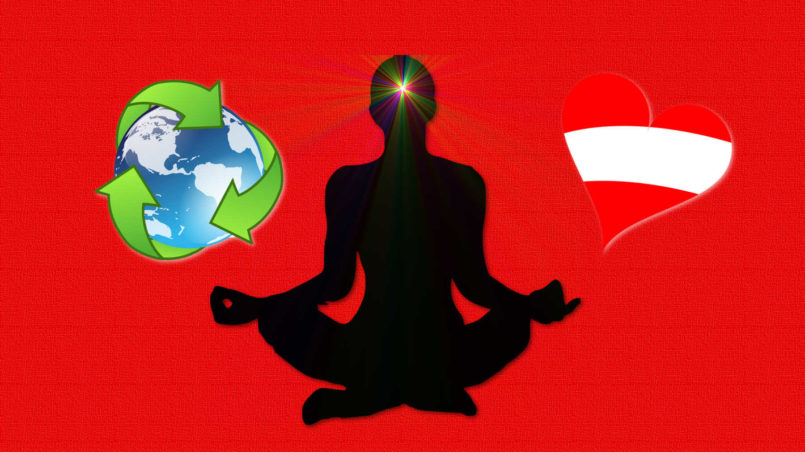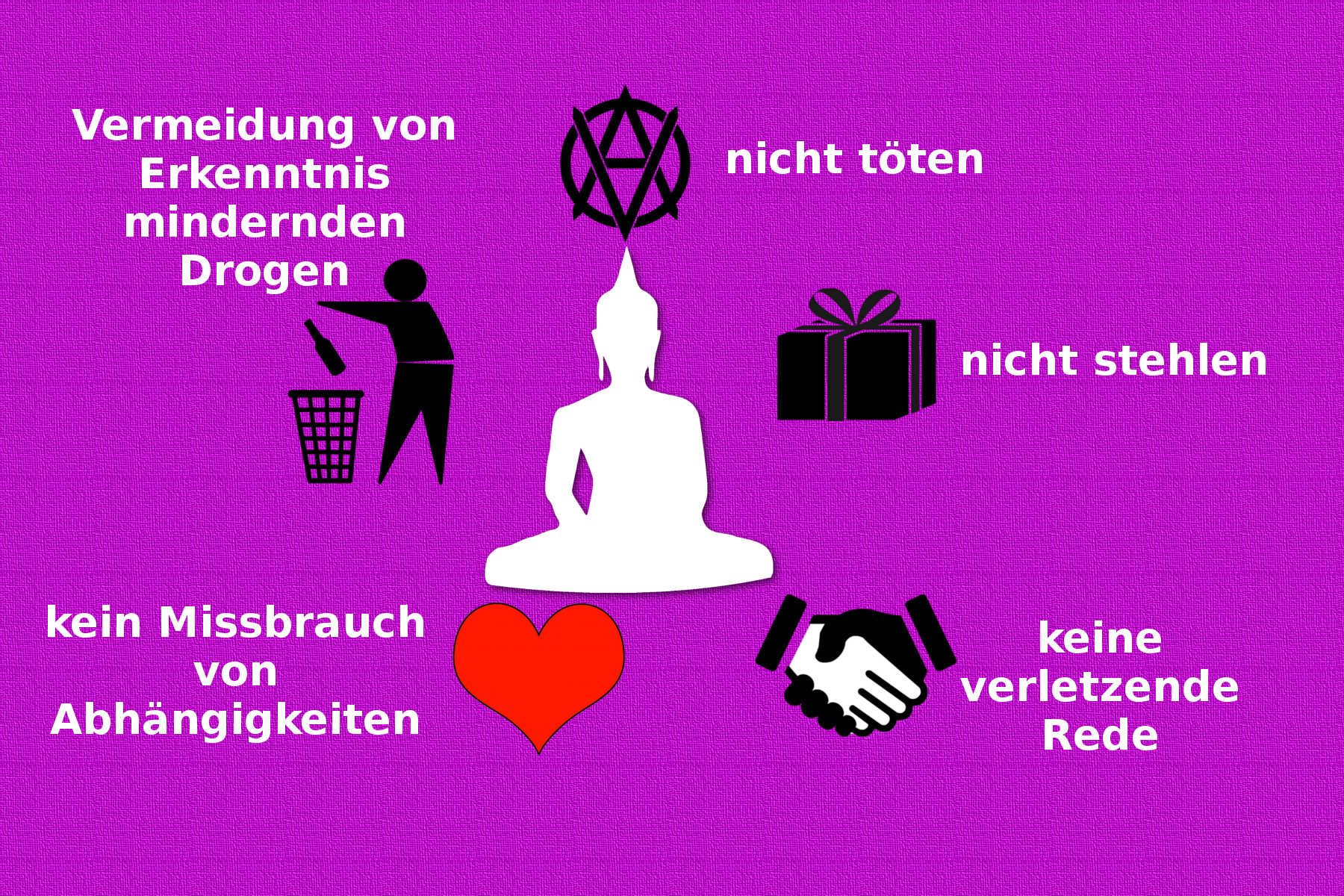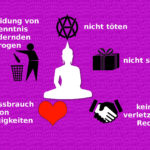Business Ethics: For One Another

In the first part of my series, I explained why we need business ethics (“Business ethics: Raising Awareness“). In this second part, I describe the perceptual aspects that can help you embark on your path of change. The aim of business ethics is, above all, to take care of each other; to live in harmony with nature and to taste its fruits without abusing or exploiting resources.
The Principle of Giving and Taking
When we are born today, we learn in our “grammar culture”:“To be, you have to do by doing.” Reinterpreted this means:“So that you can exist, you possess (have) by working (doing)”. In the professional world, there is also talk of employees and employers. The employer gives the employee a salary for services rendered. The employee takes the salary as a reward or recognition for his or her work. This leads to an exchange, whereby I define the money here as a substitute for needs. Money cannot be eaten, but can only be exchanged for other goods, services or even money.
Giving
… plays a role in the spiritual world, especially in interpersonal relationships. We give our friends unconditional help when they are in difficult situations. We value our fellow human beings when we ourselves are helped. In the substantive world, we pay tribute to our employees and colleagues for their achievements in the form of awards. But also among average citizens, one always comes across actions that give humanity, such as a movement like the Volxküchen.
Taking
… in the spiritual world, above all, refers to compassion: empathy towards others. If those close to us want to solve their problems with us, we take up their emotions and share their suffering, or we rejoice with someone, unconditionally. In the material world, there are hardly any institutions that accept unconditionality. If you buy goods at the supermarket, you have to trade money for them. This condition creates substantial dependencies in today’s business world. Kost-Nix shops are a good example for the discussion and realization of unconditional giving and taking.
Five rules for observing Buddhist business ethics for lay people:

Don’t kill
It is common sense and should be self-evident that people do not kill each other. In Buddhist business ethics, however, this point does not only include people but all living beings. If we eat meat, we kill animals. We kill them in abundance in industrial slaughterhouses, in intensive livestock farming and animal factories. In the 1980s, when I was a child, families only had meat on Sundays at family meals. People, post-traumatised after the Second World War, could not afford to waste food. VGT, for example, is addressing the problems of animal factories.
Do not steal
At the beginning of the 20th century, an economic turnaround was initiated at the opium conference. In the 1920s, the paper industry shifted to forests. After the demonisation of the hemp plant, the pharmaceutical industry experienced its breakthrough after the discovery of amphetamines. Workers were removed from the fields and sentenced to hard labour in mines. Oil production and coal mining flourished. The exploitation of people, animals, and nature began. To this day, forests are being cleared and nature is being robbed of raw materials by means of environmentally harmful methods (such as fracking). The consequences are extinct animal species and people who have to starve to death. The Unconditional Basic Income is an option to counteract injustice. In Austria, two non-governmental organisations are trying to stop the theft of natural resources and the exploitation of mankind: Global2000 and attac.
No offending or false speech
Since the proliferation of social media, the limit of respect for other people has fallen. Shitstorms, hate speech, defamation or the dissemination of so-called fake news take place every day on various internet platforms. In front of a monitor, everyone feels anonymous, inhibitions fall, people post until the “enemy” is silenced. Such practices can sometimes cause severe psychological damage or even lead to suicide. One of the first approaches to regulating coexistence was the book Knigge – Über den Umgang mit Menschen.
The handling of our data in social media is also a sensitive subject: data protection is a human right, quintessenz.at explains the abuses in this area.
No abuse of (especially sexual) dependencies
In some professional fields, it is not important what skills someone brings to a company, but rather there are interpersonal dependencies that determine promotions and opportunities for advancement. In some cases, sexual dependencies even occur, which are defined in the jargon as “screwing your way up”. This expression indicates that certain jobs exist only through sexual relations. Most people will probably think about the Lewinsky affair. In the film industry, this also seems to be the order of the day as the Weinstein scandal recently showed.
The avoidance of all kinds of drugs that reduce the clarity of ethical attitudes and knowledge
Everything that expands consciousness and brings knowledge into life is forbidden. A clear example is today’s “Struggle for hemp“: where science stops, the pharmaceutical industry brings its own pseudo-scientific sales strategy into play; it makes a distinction between healing substances that have morally good molecules and those that have morally evil molecules. “In this way, cannabis is also declared ‘scientifically’ to be an aggressive killer herb, and then used as a trigger for the ‘demotivational syndrome’ -‘ hash makes lax’ – to make a career with the opposite. And so pseudo-scientific doctrinal and expert opinions, which are subject to the subsidy of pharmaceutical companies and politicians, still ensure that, in the classification of the dangerousness of drugs, […] a pharmaceutical dogma, which has as little to do with science as with rational politics, is adhered to”, Mathias Bröckers writes in his book “Die Drogenlüge” (“The Drug Lies”)1.
Austria is one of the world’s pioneers in dealing with business ethics and offers solutions in the following institutions:
- Fair distribution with an unconditional basic income: BGE in Austria
- Acceptance of alternative currencies that respect the environment: FairCoin, V-Taler, Exchange circles
- Provide superfluous foodstuffs to people free of charge: FoodCoops, FairTeiler
- Repair equipment in RapairCafes: Repair Guide Austria
- Usable items that are not used, can be handed over or taken free of charge: Kost-Nix-Laden
- Use the treasures of nature properly: Cannabis Social Clubs Austria
- Use of open bookcases to reduce paper consumption: Open bookcases and bookcrossing
ad 1) Translation of M. Bröcker’s comment by Idealism Prevails
Translation German-English: Anna Dichen
Credits
| Image | Title | Author | License |
|---|---|---|---|
 |
Der Weg der Änderung- | Patryk Kopaczynski | CC BY-SA 4.0 |
 |
5 Regeln der buddhistischen Wirtschaftsethik für Laien- | Patryk Kopaczynski | CC BY-SA 4.0 |
